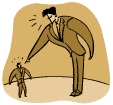Some examples of psychological harassment include:
- Making rude, insulting or offensive remarks.
- Making gestures meant to scare a person; getting back at someone.
- Discrediting the person: spreading rumors, making fun of him, humiliating
him, calling into question his beliefs or his private life, shouting abuse
at him or sexually harassing him.
- Belittling the person: forcing him to do tasks that are belittling or below
his skills.
- Preventing the person from expressing himself: yelling at him, threatening him,
constantly interrupting him, not letting him speak to others.
- Isolating the person: no longer talking to him at all,
pretending he does not
exist, distancing him from
others.
- Making fun of a person’s beliefs, tastes and political choices.
 2.2 Who is protected against psychological harassment?
2.2 Who is protected against psychological harassment?
[Student Manual, page 15]
Every employee in Quebec covered under the labour standards law is protected against psychological harassment at work.
The law also protects managers, construction workers, farm workers and live-in caregivers against psychological harassment.
 2.3 Does the harasser have to be a co-worker?
2.3 Does the harasser have to be a co-worker?
[Student Manual, page 16]
No. You can be psychologically harassed at work by:
- a co-worker;
- a boss;
- a customer of the company;
- a supplier of the company.
 2.4 Can I be psychologically harassed at work if the act only happened once?
2.4 Can I be psychologically harassed at work if the act only happened once?
[Student Manual, page 16]
Yes. Usually an act must be repeated several times before it is considered psychological harassment. However, the act can be considered harassment if:
- the act is very serious, and
- it continues to have a harmful effect on you for a long time.


